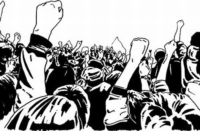The working class is already divided by capitalism. If we are to build a revolutionary movement we, as communists, must unite those divisions, not further deepen them. To do so we need to combat the tendencies of tailism and economism in our own ranks.
The ruling class utilise a range of tactics designed to weaken the working class, but none of these is more insidious than the sowing of discontent and disunity. Capitalists use racism, sexism, sectarianism, homophobia, transphobia and any number of forms of bigotry and prejudice as a means of dividing the working class and turning people against one another. The simple reason is this: a class divided cannot fight a united struggle.
Communists must bring together all elements of the working class to fight for an end to exploitation; however, too often there are obstacles in our way to achieving this, even within our own movement.
Lenin describes tailism in What Is to Be Done? as the tendency of some activists to drag (like a tail) behind the most progressive elements of the working-class movement, by reflecting in their politics only the most reactionary views of the masses.[1] This is a mistake, because, firstly, it underestimates the political and revolutionary potential of the working class, and secondly, communists must be the revolutionary vanguard of the struggle, not lagging behind it as reactionaries within the movement.
The tendency of tailism can be observed in the dismissive and confrontational attitudes some on the left take to matters of social importance—women’s struggles, LGBT+ issues, racism, etc.—that are adjacent to class struggle. We have surely all heard it said countless times that certain issues are “a distraction from class struggle,” or “not of any concern to the working class.” It surely does not need pointing out that the working class comprises people of all gender backgrounds, sexual orientations, races, and ethnicities, and these struggles are of direct and immediate concern to them and their lives. In fact these struggles are inextricably linked to class struggle and should always be regarded as such.
As communists, we assert that the primary contradiction that shapes and defines the world is that of class struggle: between the bourgeoisie and the working class. However, it does not follow from this that our work or our analysis must disregard all other contradictions and struggles as irrelevant. Quite the contrary: we must seek to unite struggles against all forms of exploitation in the revolutionary fight for communism. This is the very nature of class struggle.
In addition, Lenin critiques the narrow focus of economism, which he describes thus: “The Economists [limit] the tasks of the working class to an economic struggle for higher wages and better working conditions, etc., asserting that the political struggle [is] the business of the liberal bourgeoisie.”[2] He asserts that the fight for revolutionary gains must be waged on a political as well as an economic front. The task of communists is to unite the working class in a revolutionary movement, not to limit our focus to mere economic demands, which are in any case quantitative and not transformative.
To give a clear example of the limits of the politics of economism, we can recall how women’s participation in the labour market was initially opposed within the trade union movement, on the grounds that it was a means used by capitalists for lowering wages for workers more generally.[3] Such a view seems absurd today, and demonstrates how economism can be a dangerous and counter-revolutionary form of chauvinism. As communists, we do not ask for capitalists to give workers a larger slice of the pie: we fight for workers to take possession of the pie in its entirety.
There are many on the left who will seek to foment the divides that capitalism creates, through patriarchy, racism, sectarianism, etc. They pit different forms of struggle against one another and stoke hostility between different groups. It must be noted that there are of course bourgeois forms of feminism, LGBT+ activism, anti-racism etc. that are actively opposed to the emancipation of the working class, and hostile to communism. This is not in doubt. However, it does not follow that the struggles of women, trans comrades, victims of racism and other forms of bigotry and prejudice are in any way counter-revolutionary or anti-communist simply because there exist bourgeois interests who attempt to co-opt them. To think and act otherwise is to fall into the trap of chauvinism.
Our understanding of different forms of oppression and exploitation enriches our theory of class struggle; it does not stand opposed to it. In practical terms, this means that communists must be at the forefront of working-class struggle in all its various forms, fighting with our comrades and not against them.
1. V. I. Lenin, What Is to Be Done? The Burning Questions of Our Movement (1902), at www.marxists.org/archive/lenin/works/1901/witbd/ii.htm.
2. V. I. Lenin, “A talk with defenders of economism” [1901] in Lenin, Collected Works (Foreign Languages Publishing House, Moscow, 1961), vol. 5, p. 313–320, at www.marxists.org/archive/lenin/works/1901/dec/06.htm.
3. Nicole Busby and Rebecca Zahn, “Women’s labour and trade unionism: A dangerous combination?” (2016), at http://dangerouswomenproject.org/2016/06/20/womens-trade-unionism/.






